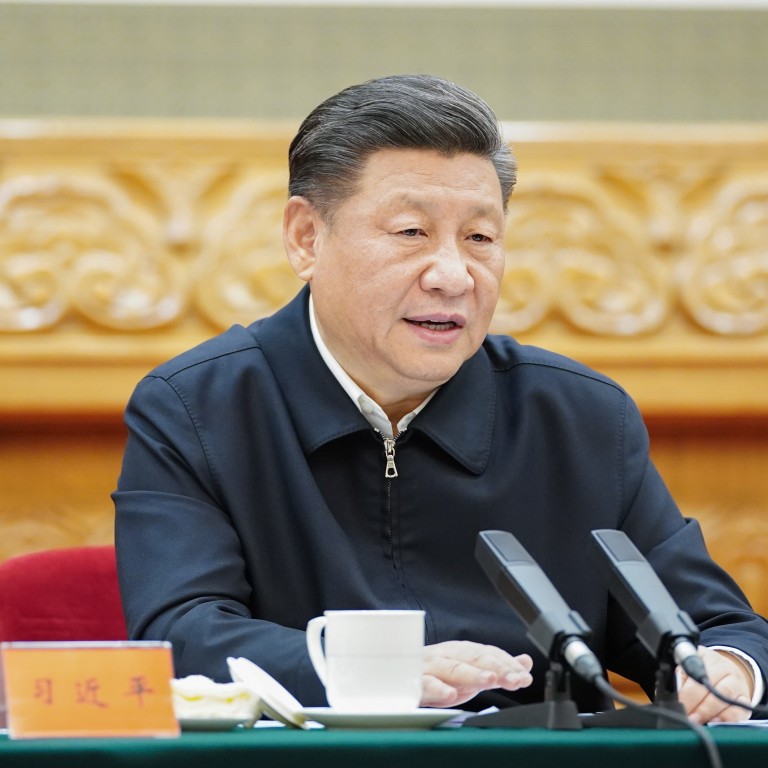
Coronavirus: Xi Jinping rings alarm on China economy as country shifts priority to maintaining growth
- President Xi Jinping has acknowledged the ‘unavoidable’ impact of the coronavirus epidemic on China, but implored local officials to resume production where possible
- Xi’s comments come as concern grows that the economy could be dragged into a deep slowdown, threatening the country’s 2020 development goals
President Xi Jinping has rung the alarm bell on China’s economic growth as worries mount over the coronavirus’ impact on the economy, unemployment and global supply chains.
“It is unavoidable that the novel coronavirus epidemic will have a considerable impact on the economy and society,” said Xi in a lengthy televised address that was watched by as many as 170,000 officials and published by state news agency Xinhua.
But Xi, China’s most powerful leader in decades, added the country’s social and economic system “can’t be paused for long”.
The edited version of Xi’s speech was published soon after it was delivered, reflecting the urgency of the guidelines.
It is unavoidable that the novel coronavirus epidemic will have a considerable impact on the economy and society
The virus, which has claimed the lives of more than 2,500 people and infected more than 77,000 in the mainland, is the biggest public health crisis to hit China and a major test of Xi’s leadership.
Xi said that as many as 1,396 counties and districts, some 46 per cent of the nation’s total, had not reported a single confirmed case of the coronavirus.
These low-risk zones, along with areas with only a small number of infections, should “comprehensively restore production” and life as usual, he said.
“Medium-risk” regions should resume production in an “orderly manner”, while the priority for hard-hit areas like Hubei, the province at the centre of the outbreak, was still containing the virus, he said.
The televised conference on Sunday marked a rare occasion in which Xi directly addressed officials at the county-level.
A key part of the vision is doubling the size of the economy from 2010, which economists say will require minimum gross domestic product (GDP) growth of 5.6 per cent this year.
Xi said China’s economic fundamentals remained sound and the virus’ impact would be “short-term and generally under control”. But he said that macroeconomic policies “must prevent economic growth from sliding out of a reasonable range” this year, without elaborating.
“As long as we can turn the crisis into an opportunity to restore production and social life in an orderly fashion … we will be able to achieve the economic and social development goals set for this year,” Xi said.
Some economists like Wang Jun, from Zhongyuan Bank, have called for China’s growth target to be eased to “5.5 per cent to 6 per cent” due to the outbreak.
Wu Qi, a senior fellow at Beijing-based think tank the Pangoal Institution, said the televised event was “a tone-setting conference that shifted the priority towards the economy”.
Following the speech, Guangdong, an economic powerhouse and the second hardest-hit province by the virus, announced it would downgrade its public health emergency grade to the second highest level on Monday, paving the way for fewer restrictions on the flow of people and cargo. Shanxi, Guansu, Liaoning, Guizhou and Yunnan provinces have also downgraded emergency levels.
While authorities are ramping up efforts to kick start the economy at home, some observers have raised concerns about the long-term effects for China’s position in the global economy.
“The medium- and long-term impact of the coronavirus has increasingly become a concern, especially whether the coronavirus will dampen the global supply chain or weaken China’s international role,” Wu said.
China must ensure the smooth operation of “the industrial supply chain for foreign trade” and “stabilise its share of the global market”, Xi stressed.

